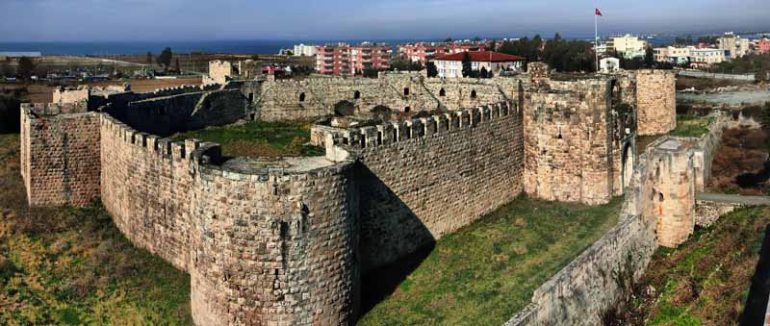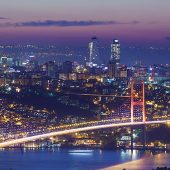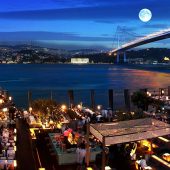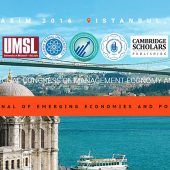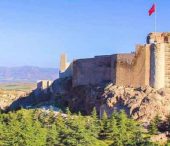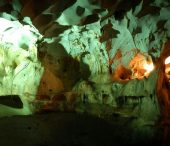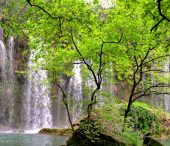Antakya is the seat of the Hatay Province in southern Turkey, near the border with Syria. In ancient times the city was known as Antioch and has historical significance for Christianity, being the place where the followers of Jesus Christ were called Christians for the very first time. The city and its massive walls also played an important role during the Crusades.
Geography
Antakya is located on the banks of the Orontes River (Turkish: Asi Nehri), approximately 22 km (14 mi) inland from the Mediterranean coast. It enjoys a Mediterranean climate with hot and dry summers, and mild and wet winters; however due to its higher altitude, Antakya has slightly cooler temperatures than the coast. The city is in a valley surrounded by mountains, the Nur Mountains to the north and Mount Keldağ (Jebel Akra to the south, with the 440 m high Mount Habib Neccar (ancient Silpius) forming its eastern limits. The mountains are a source of a green marble. Antakya is at the northern edge of the Dead Sea Rift and vulnerable to earthquakes.
The plain of Amik to the north-east of the city is fertile soil watered by the Orontes, the Karasu River and the Afrin River, the lake in the plain was drained in 1980 by a French company. At the same time channels were built to widen the Orontes River and let it pass neatly through the city centre. The Orontes is joined in Antakya by the Hacı Kürüş stream to the north-east of the city near the church of St Peter, and the Hamşen which runs down from Habib-i Neccar to the south-west, under Memekli Bridge near the army barracks. Flora includes the bay trees and myrtle.
The city of Antakya today
Mount Habib Neccar and the city walls which climb the hillsides symbolise Antakya, making the city a formidable fortress built on a series of hills running north-east to south-west. Antakya was originally centred on the eastern bank of the river but since the 19th century the city has expanded with new neighbourhoods built on the plains across the river to the south-west, and there are four bridges across the river linking the old and new cities. However, as in so much of Turkey, the buildings of the last two decades are all concrete blocks, and Antakya has lost much of its classic beauty. The narrow streets of the old city can be clogged with traffic.
Although the port of Iskenderun has become the largest city in Hatay, Antakya is a provincial capital still of considerable importance as the centre of a large district, growing in wealth and productiveness with the draining of Lake Amik. The town is a lively shopping and business centre with many restaurants, cinemas and other amenities, centred on a large park opposite the governor's building and the central avenue Kurtuluş Caddesı. The tea gardens, cafes and restaurants in the neighbourhood of Harbiye are one of the city's most popular spots, particularly for the variety of meze in the restaurants. The Orontes River is rather smelly when water is low in summer. Although the people are generally modern in outlook, there is little in the way of wild night life. In the summer heat people will stay outside until late in the night walking with their families and friends and munching on snacks.
Being so near the Syrian border Antakya is a cosmopolitan city unlike most of the cities in Turkey today, and it has not experienced the 1980s and 1990s mass immigration of people from eastern Anatolia that has radically swelled the populations of other Mediterranean cities such as Adana and Mersin. As a result both Turkish and Arabic are still widely spoken in Antakya although you do not see Arabic written very much. A mixed community of faiths and demoninations co-exist peacefully here; although almost all the inhabitants are Muslim a substantial proportion adhere to the Alevi and the Arab Nusayri traditions, in 'Harbiye' there is a place to honour the Nusayri saint Hızır. There are a number of tombs of Muslim saints, both Sunni and Alevi, throughout the city. There are also still small active Christian communities in the city, the largest church being St Peter and St Paul on Hurriyet Caddesi. With its long history of spiritual and religious movements Antakya is still a place of pilgrimage for Christians and Muslims and furthermore still carries a reputation in Turkey as a centre of spells, fortune telling, miracles and spirits.
Local crafts include a soap scented with oil of bay tree.
Cuisine
The cuisine of Antakya is renowned. Popular dishes include the typical Turkish kebab, served in Antakya with spices and onions in flat unleavened bread, or with yoghurt as ali nazik kebab. Hot spicy food is a feature of this part of Turkey, along with Turkish coffee and local specialities including:
Sweets
Künefe - a hot Arabic cheese pastry sweet. Antakya is Turkey's künefe capital, with the pastry shops in the centre all proclaiming themselves king Turkish: kral. The secret is in the light yellow cheese that they use.
Müşebbek - rings of deep fried pastry

